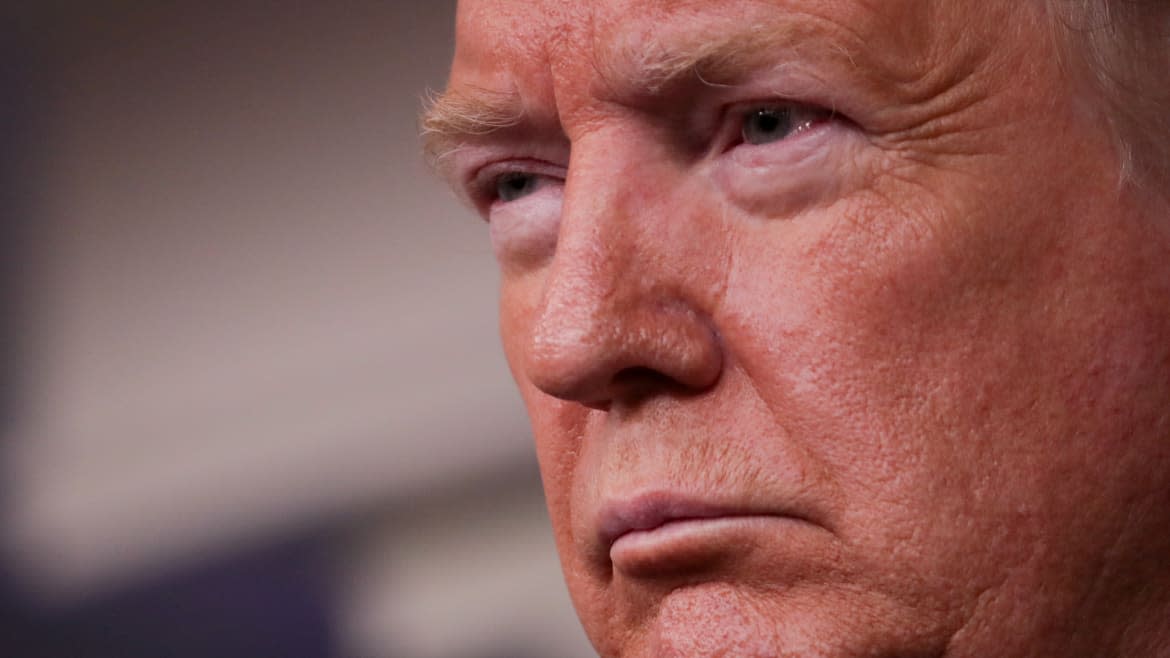FDA Urges Caution After Trump Says Malaria Drug Will Be Available to Coronavirus Patients ‘Almost Immediately’

An anti-malaria drug has been approved for use in treating coronavirus symptoms, President Donald Trump said Thursday—however, officials immediately cautioned that approval for widespread use was still a long way off.
The drug Hydroxychloroquine, used on malaria and arthritis patients, will be made available “almost immediately” to coronavirus patients with a prescription, Trump said during the administration’s coronavirus task force briefing on Thursday.
The U.S. Food and Drug Administration has slashed red tape so they could fast track the approval of the drug’s new use, he added. It has had “very encouraging early results” in tests on COVID-19, he said, adding that the coronavirus pandemic was now a “medical war.”
Trump said people would be trying the drug “literally within a few days.” Almost immediately, however, the FDA cautioned a more measured approach.
Stephan Hahn, head of the FDA, said he would not confirm a timeline but, given that the drug was already approved for other usages, researchers had information about possible side effects. He said the initial approval phase was done quickly, but the testing phase was only now getting underway.
“I want to assure you we’re working as quickly as we can, I don’t want to speculate about a timeline,” he said, adding that the FDA was “looking at everything that’s coming across our desks as possible treatment options for coronavirus.”
Hahn said the drug would be initially used under “compassionate use,” which means doctors can ask to use the experimental drug on patients. The FDA can then gather data on its safety and efficacy from doctors ahead of a full-scale approval. “We are working expeditiously,” he said.
He said the president had directed the agency to take a closer look at whether the use of chloroquine could be expanded more widely beyond compassionate use.
“And again, we want to do that in the setting of a clinical trial,” he said, “a large, pragmatic clinical trial to actually gather that information and answer the question that needs to be asked and answered.”
After Trump’s comments, Bloomberg reported that an FDA spokesperson told the news organization that hydroxychloroquine had not yet been specifically approved to help people diagnosed with COVID-19.
In a statement posted online Thursday, the FDA said there are “no FDA-approved therapeutics or drugs to treat, cure or prevent COVID-19, there are several FDA-approved treatments that may help ease the symptoms from a supportive care perspective.”
Studies are underway to determine the efficacy of using chloroquine to treat patients with mild-to-moderate COVID-19 to “potentially reduce the duration of symptoms, as well as viral shedding, which can help prevent the spread of disease,” the agency said.
A study published by Nature on Tuesday found that Hydroxychloroquine, a less toxic derivative of chloroquine, was effective in stopping a COVID-19 infection in vitro.
“There’s promising information to say that hydroxychloroquine and chloroquine may work based on laboratory studies, but that needs to be confirmed with human studies,” Dr. Timothy Brewer, a professor of medicine and epidemiology at UCLA, told The Daily Beast on Thursday.
“I think the FDA is correct in saying we clearly should study this but we should do it in the setting of a clinical trial to figure out, is this actually working or not in people?”
Hahn said on Thursday a second drug called remdesivir, made by Gilead Sciences, was also in a clinical trial in the U.S. and had been approved for “compassionate use” by doctors with suitable patients. Gilead said in February that they were expanding clinical trials of the anti-viral drug’s possible usage on COVID-19 patients.
In a statement, the FDA said innovators were looking into anti-viral drugs that might treat the virus, as well as host targets that may be helpful in reducing lung inflammation and improving lung function in COVID-19 patients. The agency said one drug company had started a clinical trial of an antibody drug and there was interest in evaluating the use of convalescent plasma and hyperimmune globulin, antibody-rich blood products that are taken from blood donated by people who have recovered from COVID-19 and could possibly treat the illness in others.
The U.S. has confirmed at least 7,701 COVID-19 cases and 118 deaths, according to the Associated Press’ latest figures.
During Thursday’s press conference, Vice President Mike Pence said he had visited manufacturers to ensure that millions of N95 masks and other equipment were in production.
Towards the end of the briefing, however, Trump gave into one of his favorite pastimes of complaining about press coverage, reporters, and “fake news.”
It started when a reporter for One America News Network asked the president a question about whether he “considers the term Chinese food racist.”
Before answering, the president complimented OAN for treating him “very nicely.”
The moment became more surreal as the OAN reporter derided “major left wing news media,” for describing Trump as racist because of his decision to call the coronavirus the “Chinese Virus.”
The moment allowed Trump to return to familiar newspaper complaints about The Wall Street Journal, The New York Times and The Washington Post as health fears and the pandemic continue to plague the nation.
“There’s no chaos in the White House,” Trump said. “We have unbelievable professionals.”
Get our top stories in your inbox every day. Sign up now!
Daily Beast Membership: Beast Inside goes deeper on the stories that matter to you. Learn more.

